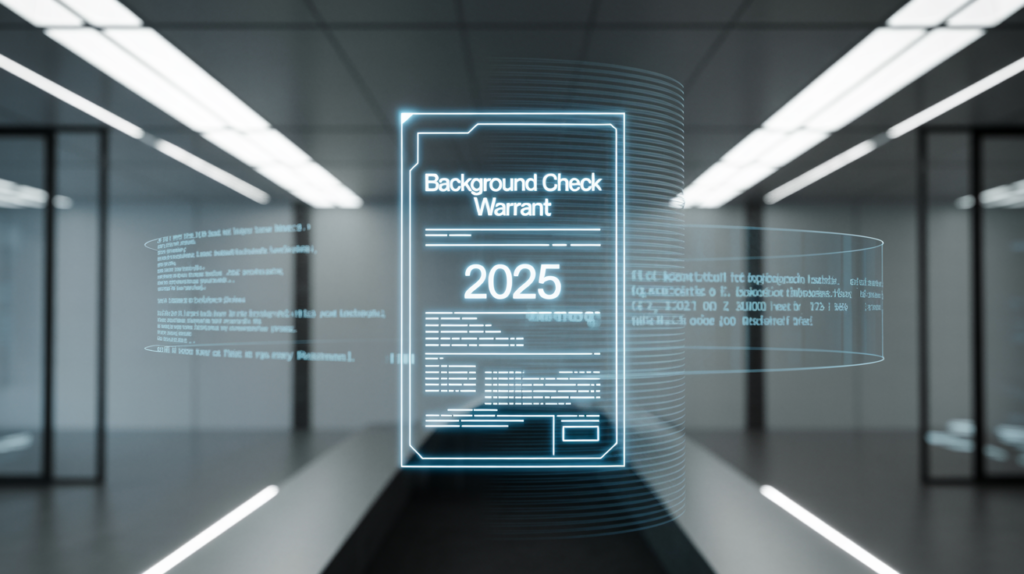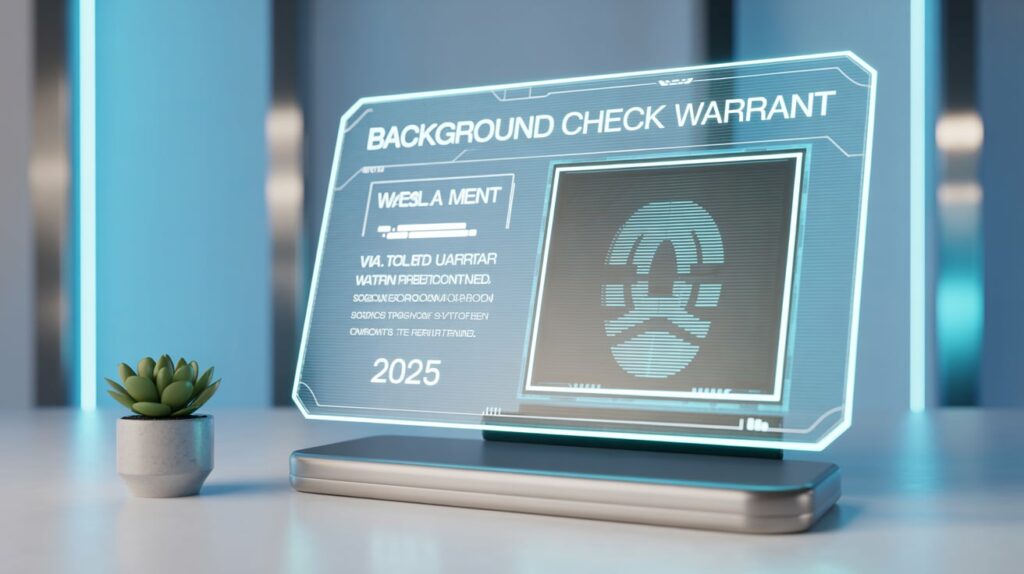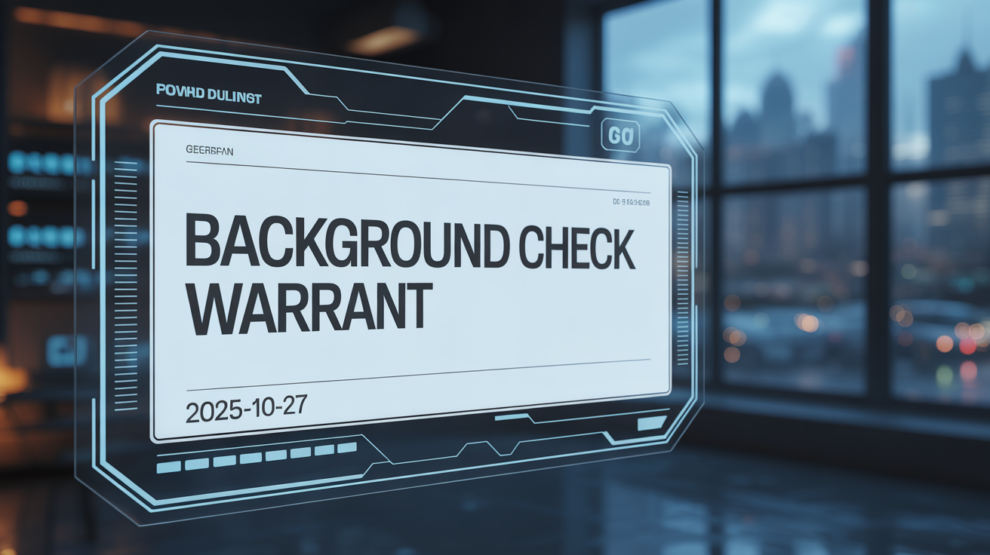Background Check Warrant in 2025 reveal active and past warrants, how they impact jobs, housing, gun purchases, and more. Learn your rights, how to check your record, and what to do if a warrant shows up.
Table of Contents
In today’s world, background checks are a routine part of employment, housing, and legal procedures. However, a specific concern that often arises is whether someone has a warrant for arrest and how that information appears in a background check. As we move through 2025, it’s more important than ever to understand how background checks and warrants interact — especially if you’re applying for a job, renting a home, or simply want to verify your own record.
This article explores everything you need to know about background check warrants in 2025 — what they are, how they work, how they appear on checks, and what you can do if one appears on your record.
What Is a Background Check Warrant?

A warrant is a legal document issued by a judge or magistrate that authorizes law enforcement to perform certain actions, such as arresting an individual or searching property. In the context of background checks, a warrant background check is a process used to determine whether someone has any active warrants or past warrant records that may impact their legal or professional standing.
Warrants can be:
- Arrest Warrants – issued when someone is suspected of a crime.
- Bench Warrants – issued when someone fails to appear in court.
- Search Warrants – though not usually listed in standard background checks, they are part of public court records.
How Warrants Appear in Background Checks
In 2025, most background checks—especially those performed by employers or law enforcement—use national and state criminal databases that include warrant information. Depending on the type of check, a warrant may appear in the results:
- Instant background checks may not always show warrants, especially if they’re newly issued or from another state.
- Fingerprint-based checks (FBI or state-level) are more thorough and are likely to include warrant data.
- Court and law enforcement database checks will show any active or resolved warrants.
If a warrant is found during a background check, it can cause delays, disqualification from job opportunities, or even lead to an arrest depending on the nature of the warrant.
Why a Background Check May Include a Warrant
Employers, landlords, and government agencies include warrant checks for several reasons:
- Public safety: To avoid hiring or housing someone with unresolved legal issues.
- Legal compliance: Especially in regulated industries like healthcare or childcare.
- Risk reduction: Active warrants may signal that a person is avoiding prosecution or has legal troubles.
It’s important to know your own status by requesting a self-background check to avoid being caught off guard.
Different Types of Background Checks That May Reveal Warrants

1. Employment Background Checks
When you apply for a job—especially in sensitive sectors like healthcare, education, finance, government, or law enforcement—your employer may perform a criminal background check through a third-party screening agency.
What It Reveals:
- Active warrants (bench warrants, arrest warrants)
- Past arrest and conviction records
- Dispositions of criminal cases (whether charges were dropped, dismissed, or resulted in conviction)
Why It Matters:
Employers use this information to:
- Ensure workplace safety
- Comply with legal and regulatory requirements
- Avoid hiring individuals who may pose a risk to clients, co-workers, or public trust
Tip: If you have an outstanding warrant, it could result in an automatic rejection. It’s crucial to resolve any legal issues before job hunting.
2. Tenant Background Checks
Landlords and property managers routinely conduct background checks on prospective tenants. These checks help assess whether the applicant poses any financial, behavioral, or legal risks.
What It Reveals:
- Active arrest warrants or bench warrants
- Past evictions (depending on the check)
- Criminal history involving violence, theft, or drugs
Why It Matters:
Landlords must protect other tenants and their property. If a person has an outstanding warrant—especially related to violent or drug-related offenses—they may be denied housing to avoid potential liability or community disruption.
Tip: In Kansas, some landlords may use local databases or third-party services that aggregate warrant and court data. Always check your own records before applying for a lease.
3. Government Security Clearance Checks
Jobs requiring access to confidential, classified, or sensitive government information require a formal security clearance. This involves a deep background check by federal agencies such as the Department of Defense or Office of Personnel Management.
What It Reveals:
- Active and resolved warrants (including those from other states or federal jurisdictions)
- Any ties to criminal or suspicious behavior, even if charges were dropped
- Full criminal and civil court history
Why It Matters:
Even a resolved warrant may raise red flags in a security clearance investigation, especially if it involves:
- Financial fraud
- Domestic violence
- Substance abuse
- Failure to appear in court
The clearance process evaluates trustworthiness, reliability, and loyalty to the U.S. government. A past warrant could delay or completely block clearance approval.
Tip: Disclose all legal matters upfront during the clearance process. Honesty often matters more than a flawless record.
4. Gun Purchase and Firearm Licensing Checks
If you apply to purchase a firearm or obtain a concealed carry permit in Kansas (or most U.S. states), a background check is required. This check often goes through the National Instant Criminal Background Check System (NICS) or is handled by the state’s Department of Public Safety or law enforcement agencies.
What It Reveals:
- Active arrest warrants
- Felony convictions
- Domestic violence restraining orders
- Mental health adjudications (in some states)
Why It Matters:
Federal law prohibits individuals with certain active warrants or past criminal convictions from purchasing firearms. An active warrant will immediately disqualify the applicant and may even trigger law enforcement notification in some cases.
Tip: If you’ve had a prior criminal matter, check with local law enforcement or the Kansas Bureau of Investigation (KBI) to verify your record status before attempting to purchase a firearm.
Can Warrants Be Hidden or Expunged from Background Checks?
- Active Warrants cannot be hidden — they are public records until resolved.
- Resolved Warrants (where charges were dropped, dismissed, or adjudicated) may still show up unless expunged.
- In some states, including Kansas, expungement of a criminal record is possible after meeting eligibility criteria (e.g., time since resolution, offense type, and no further violations).
How to Check for Warrants Online in Kansas or Nationwide

To check for warrants:
- Kansas Bureau of Investigation (KBI) – Check state-level records via:
https://www.kansas.gov/kbi/criminalhistory - National Crime Information Center (NCIC) – Law enforcement-only database used during fingerprint-based checks.
- County Court Websites – Many Kansas counties provide online case search tools where active cases and warrants can be checked.
- Reputable Online Public Record Services – Use trusted services (e.g., TruthFinder, BeenVerified) for general public searches, though they may not be fully up-to-date.
Legal Implications of Having an Active Warrant
- Travel Restrictions – You may be flagged during TSA screenings or at border checks.
- Driver’s License Suspension – Some warrants lead to DMV actions.
- Missed Job Opportunities – Many employers will not consider candidates with unresolved legal issues.
- Increased Law Enforcement Scrutiny – Routine stops or identity checks could result in immediate detention.
Best Practices for Avoiding Surprises in Background Checks
- Run a Background Check on Yourself Annually – Know what others might see.
- Resolve Any Outstanding Legal Issues Promptly – Ignoring a bench warrant from a missed court date can snowball.
- Keep Documentation of Resolved Cases – You may need proof of resolution when applying for jobs or housing.
- Consult with an Attorney – If you believe a warrant was issued in error or you want to seek expungement.
Updated Legislation in 2025 Regarding Background Checks
As of 2025, several states—including Kansas—are tightening regulations around:
- Disclosure rules for employers (e.g., “Ban the Box” laws).
- Applicant rights to receive a copy of their background check report.
- Mandates for employers to give individuals a chance to explain or dispute findings before making final decisions.
What to Do If a Warrant Appears on Your Background Check
If a background check in 2025 shows a warrant against you, here’s what to do:
- Confirm the Warrant – Contact the issuing court or police department to verify it.
- Resolve It Promptly – Work with an attorney to clear up the issue.
- Be Proactive – Disclose the situation to a potential employer if appropriate.
- Request Expungement – If the case was resolved and you’re eligible, request to seal or expunge the record.
FAQs About Background Check Warrants in 2025
1. Will a warrant always show up in a background check?
Not always. It depends on the type of check performed. Name-based checks might miss out-of-state or recently issued warrants. Fingerprint or law enforcement checks are more comprehensive and usually do include them.
2. Can I be arrested because of a background check showing a warrant?
Yes, especially if it’s an active arrest warrant. If you are subject to one and your location becomes known during a background check, authorities may act on it.
3. Can I do a background check on myself to see if I have a warrant?
Yes. You can request your own background check through your state’s criminal justice agency or the FBI. You can also check with your local police department or use reputable online services that search public records.
4. How long do warrants stay on your record?
Warrants remain active until they are resolved by the court. Even after resolution, the fact that a warrant was issued may stay on your criminal record unless it is expunged or sealed.
Conclusion
As we navigate 2025, understanding how warrants affect background checks is essential for maintaining your legal and professional reputation. Whether you’re applying for a job, volunteering, or moving into a new home, it’s crucial to know what might show up on your record.
Take control by performing a self-background check, resolving any outstanding warrants, and staying informed about your rights. Remember, knowledge is power — and in this case, it might save you from missed opportunities or legal complications.
Do Follow Dragcast on Social Media For More Such Content.








Add Comment